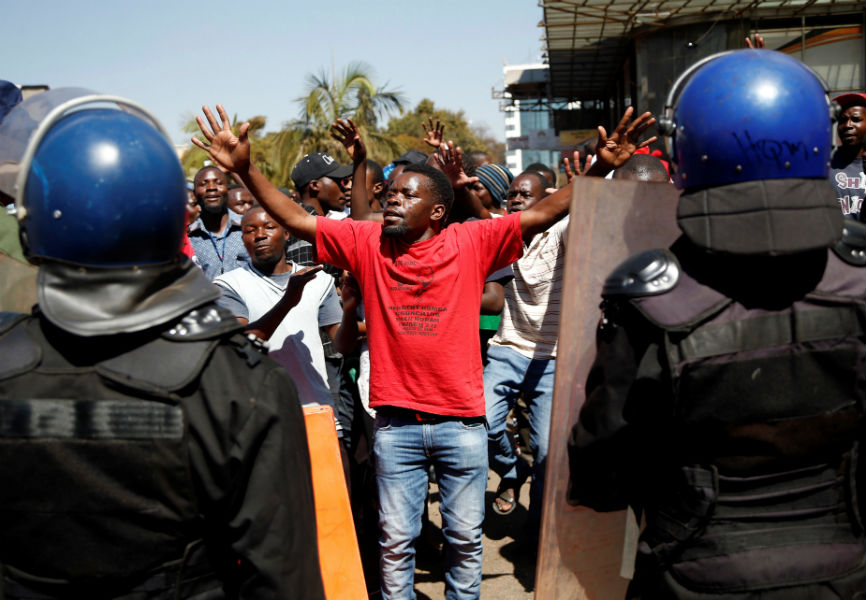Billed as a new chapter for Zimbabwe, the 30 July election was the first since 1980 without Robert Mugabe on the ballot and represented a chance to shed the country's pariah status, win back foreign investment, and seek debt and sanctions relief. But Emmerson Mnangagwa's narrow victory over opposition leader Nelson Chamisa has been marred by post-election violence and allegations of rigging. Eurasia Group Africa analyst
Ty McCormick discusses the implications.
Are there doubts about the fairness of the elections?
Although the campaign period was freer than in the past, state media outlets continued to favor the ruling Zanu-PF party and there were reports of sporadic intimidation. The election commission also refused to allow an independent audit of the voter rolls, despite reports from civil society organizations that showed troubling anomalies.
Voting on election day was largely peaceful and orderly, although there were clear irregularities, including high numbers of assisted voters and polling stations that failed to post results promptly during the tallying process. Delays in releasing the election results raised further doubts about the integrity of the process. EU observers commended the Zimbabwean government for the improved climate of the campaign period but concluded that a
"truly level playing field was not yet achieved."
Why did violence break out?
Both Mnangagwa—who was installed as president after a coup against Mugabe last year—and opposition leader Nelson Chamisa had primed their supporters for victory. Long before the results were official, Mnangagwa tweeted that the returns were
"extremely positive" while Chamisa claimed to have won outright. Premature celebrations outside the opposition headquarters morphed into protests after the election commission released partial results for the parliamentary contest that heavily favored the ruling Zanu-PF. Polling prior to the election had suggested a closer parliamentary race, so many saw the results as proof of rigging.
Violence erupted when security forces deployed to the capital city, Harare, and began dispersing protesters. Video footage shows soldiers shooting indiscriminately into crowds and beating protesters. At least six people were killed and dozens injured.
What does the vote mean for the country's economic outlook?
The allegations of rigging and the abuses by security forces will cool investor enthusiasm in the short term and could mean that targeted US sanctions on Mnangagwa and other senior Zanu-PF officials remain in place. However, US sanctions don't apply to the Zimbabwean government, nor do they prohibit most business dealings in the country.
The larger impediments to economic revival are massive debts in arrears, a tripartite currency regime, and a wrecked industrial base. There is still a chance that Mnangagwa will find willing partners to pursue debt relief, and ultimately, an IMF bailout. The international community, and Britain in particular, is keen to re-engage with Zimbabwe, and election observers have so far refrained from blanket denunciations of the vote. If they continue to equivocate in their final reports, Mnangagwa could still be quietly ushered in from the cold. But securing a bailout would require painful reforms, including slashing public-sector expenditures and introducing a new currency regime that would almost certainly involve a haircut for depositors. These steps will be slow and painful, and ordinary Zimbabweans will continue to suffer in the meantime.
What will be the new government's main priorities?
Mnangagwa's agenda will focus on charting a path to a bailout. That means dealing first and foremost with the currency issue, most likely by introducing a new currency or adopting the South African rand. It will also mean clearing arrears and adopting austerity measures. All of this will face resistance from elements of the ruling Zanu-PF party, who have benefited from bloated public-sector spending as well as the arbitrage opportunities that come with multiple currencies.
Although the party largely rallied behind Mnangagwa during the campaign, it is riven by factions that will slow the pace of reform. Both the younger, so-called G-40 faction of Zanu-PF that was previously allied to first lady Grace Mugabe and the faction allied to the army and to Vice President Constantine Chiwenga, the former commander of the Zimbabwe Defense Forces who led the coup against Mugabe, distrust the president and will likely attempt to subvert reforms that threaten their interests. The latter faction in particular is likely to oppose efforts to enhance the competitiveness of the private sector and to strip the military of its preferential treatment in mining and other key sectors. If there's one thing that is clear after this week's election, it's that Zimbabwe isn't going to change dramatically overnight.

 A supporter of the Movement for Democratic Change (MDC) opposition party of Nelson Chamisa gestures to the riot police as they march on the streets of Harare, Zimbabwe, August 1, 2018. REUTERS/Siphiwe Sibeko
A supporter of the Movement for Democratic Change (MDC) opposition party of Nelson Chamisa gestures to the riot police as they march on the streets of Harare, Zimbabwe, August 1, 2018. REUTERS/Siphiwe Sibeko